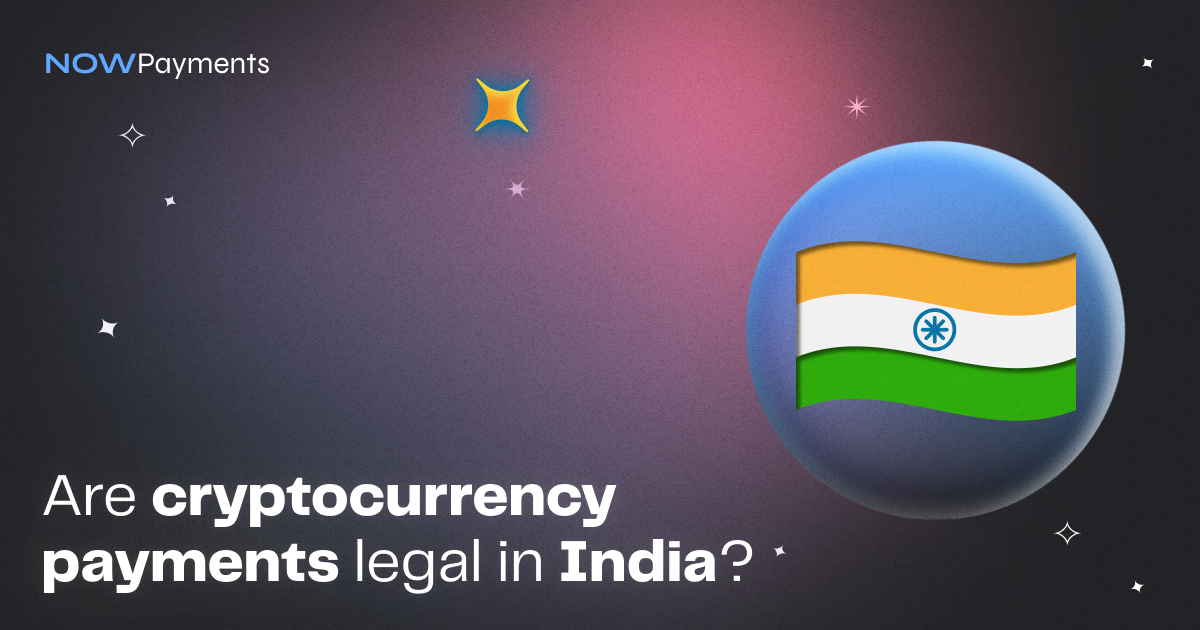The mainstream interest in cryptocurrencies has been growing in the past few years. Questions about its legality linger as new cryptocurrency users enter the market from all over the world.
India has been one of the countries that has a high interest in cryptocurrency investing and trading. An estimated 15 to 20 million cryptocurrency investors reside in India, and they collectively own assets worth about 400 billion rupees, or $5.37 billion. This is why debates among government officials have persisted regarding the legal status of digital assets. Let’s talk about the most recent significant cryptocurrency-related announcements from India’s financial institutions and how cryptocurrency is taxed in India.
Key points:
- Buying and selling cryptocurrency is not illegal in India.
- Most cryptocurrency capital gains are taxed at 30%.
- The introduction of digital rupee might change the legal standing of cryptocurrencies in India.
Can I accept crypto payments in India?
Digital assets in India are defined by Clause (47A) under Section 2 of the IT Act, 1961 as “any information or code or number or token (not being Indian currency or foreign currency) that provides a digital representation of value exchanged or functioning as a store of value, including its use in any financial transaction or investment, but not limited to investment schemes; and can be transferred, stored or traded electronically.”
India currently has the second-highest adoption rate globally and the most cryptocurrency owners. However, the legal standing of cryptocurrency has been extensively questioned by financial regulators. In April 2018, the Reserve Bank of India (RBI) attempted to outlaw cryptocurrencies as they ordered businesses to halt all cryptocurrency-related business activities. However, the Indian government hasn’t taken any action in response to these suggestions or finalized any cryptocurrency regulations.
Most recently, on February 1, 2022, when presenting the nation’s Finance Bill for the upcoming year, India’s Finance Minister, Nirmala Sitharaman, made two important announcements regarding crypto. This included taxation of crypto and the introduction of the central bank digital currency (CBDC), the digital rupee.
While cryptocurrency has not officially been declared legal, Finance Secretary T. V. Somanathan specified that it is not illegal to buy or sell crypto. The main point right now is that crypto is not considered legal tender as it’s not issued by the Indian government. In the meantime, users can accept crypto payments and use crypto exchanges for trading.
Is there tax on crypto assets in India
Under the new financial plan, crypto investors will be taxed at 30% on all transactions. This tax will apply every time an investor makes a capital gain.
Let’s say a crypto investor sends 100 rupees to an exchange and buys Bitcoin with it. If the value of their investment doubles, the profit will be charged at 30%. The investors will therefore receive 170 rupees in return for their investment.
International transactions may be exempt because the government has not yet defined how taxes might work if the recipient is overseas.
In some cases, investors may also owe an additional 1% in taxes in specific cases. This only applies to individuals or entities with a net worth of less than 5,000,000 rupees, or $66,500. If their investment exceeds 10,000 rupees, they will be subject to a 1% Tax Deducted at Source (TDS).
How can I accept crypto payments?
To start accepting crypto payments, pick a currency and create a wallet to hold your funds. Go to NOWPayments and create an account using your email and wallet addresses.
Once your account is created, you can start using the payment tools. These include:
- Plugins. Payment gateway can easily integrate into major CMS solutions like WooCommerce, Magento 2, Zencart, OpenCart, and WHMCS, which makes it perfect for accepting crypto payments in online stores.
- Cryptocurrency API. Enables tailored integration of cryptocurrency payment service into your website, platform, or mobile app. It also offers instant payment notifications (IPN).
- Invoices. With personalized invoices that your customers can pay in fewer steps streamlining the payment process.
- Billing. This feature enables you to set up sub-accounts for your users and add money to their accounts, charge payments, or distribute rewards.
- Point of sale (POS) terminal. Give your customers a simple way to use their cryptocurrency in your brick and mortar offline store. Take advantage of features like easy invoicing, quick payments, and transaction management.
Conclusion
While the legality of cryptocurrency in India is still shaky, individuals and businesses are not forbidden from buying or selling digital assets. This means that any Indian citizen can accept crypto payment as long as they are paying the proper taxes on capital gains from trading.
The Indian financial authorities may impose additional rules on other digital assets that are not issued by the Indian government once the digital rupee is launched. However, the opportunities for blockchain evolution are essentially limitless given the popularity of crypto among the Indian population. Proper regulation of crypto has the power to significantly strengthen many facets of the Indian economy, including the whole of its financial infrastructure.

